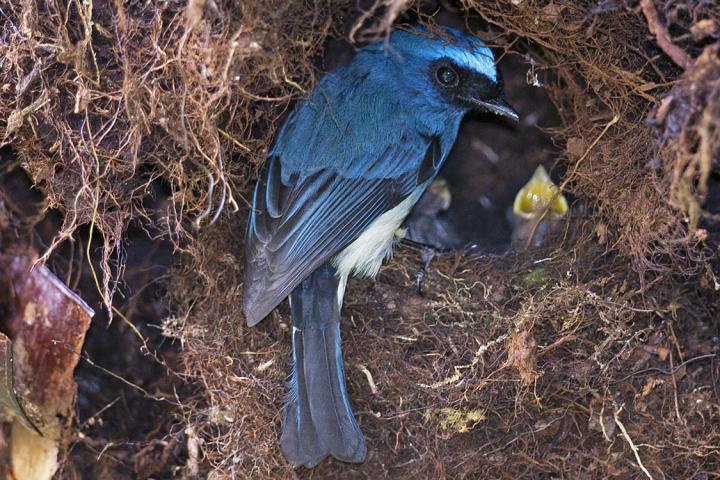
Credit: Photo by Thomas Martin
MISSOULA – With climate change heating the globe, drought more frequently impacts the reproduction and survival of many animal species.
New research from the University of Montana suggests tropical songbirds in both the Old and New Worlds reduce reproduction during severe droughts, and this – somewhat surprisingly – may actually increase their survival rates.
The work was published Aug. 24 in the journal Nature Climate Change by UM research scientist Thomas Martin and doctoral student James Mouton.
“We were extremely surprised to find that not only did reductions in breeding activity mitigate costs to survival, many long-lived species actually experienced higher survival rates during the drought year than during non-drought years,” said Martin, assistant unit leader of UM’s Montana Cooperative Wildlife Research Unit. “In contrast, shorter-lived species that kept breeding during droughts faced strong reductions in survival.”
Martin has spent his career venturing into remote jungles and living there for months to study the lives of birds. For this work, he and Mouton studied 38 different bird species in Venezuela and Malaysia over multiple years. There was one drought year for each field site, and the authors modeled future population results for the birds using three different climate change scenarios.
They knew behavioral responses to drought might determine the relative impacts on survival and reproduction. At the jungle study sites, researchers located and monitored nests of all species over many years to examine reproductive activity prior to and during the droughts. They also banded birds with colored material and used intensive re-sighting of these birds to obtain rigorous estimates of survival.
The researchers found drought reduced reproduction an average of 36% in the 20 Malaysian species and 52% in the 18 Venezuelan species.
“The negative impacts of drought on survival are well documented,” Martin said. “We therefore also expected the droughts to reduce survival, but thought that the reduced breeding activity might limit the decrease in survival.”
He said they found the population impacts of droughts were largely nullified by the reproductive behavioral shifts in longer-lived species, but shorter-lived species saw less of a benefit.
“Overall, our results have several major implications,” Martin said. “First, we show that understanding behavioral responses to drought are critical for predicting population responses. Behavioral responses to environmental conditions can help buffer the most sensitive vital rates for a given species and mitigate the overall effect on fitness.
“Second, our results provide unique support to the idea that reproduction can negatively affect survival,” he said. “This idea of a ‘cost of reproduction’ is central to life history theory but only rarely documented in wild populations.”
Finally, long-lived species are argued to be most sensitive to climate change, but the UM research suggests that many longer-lived species actually may be more resilient to drought impacts of climate change than previously expected.
“Ultimately, we hope our study can help motivate future studies into behavioral and demographic responses to shifting patterns of rainfall in more species so we can better anticipate the different impacts of climate change among species,” Martin said.
###
This work was funded by the National Science Foundation. The Nature Climate Change, paper is online at https:/
Media Contact
Thomas Martin
[email protected]
Original Source
https:/
Related Journal Article
http://dx.




